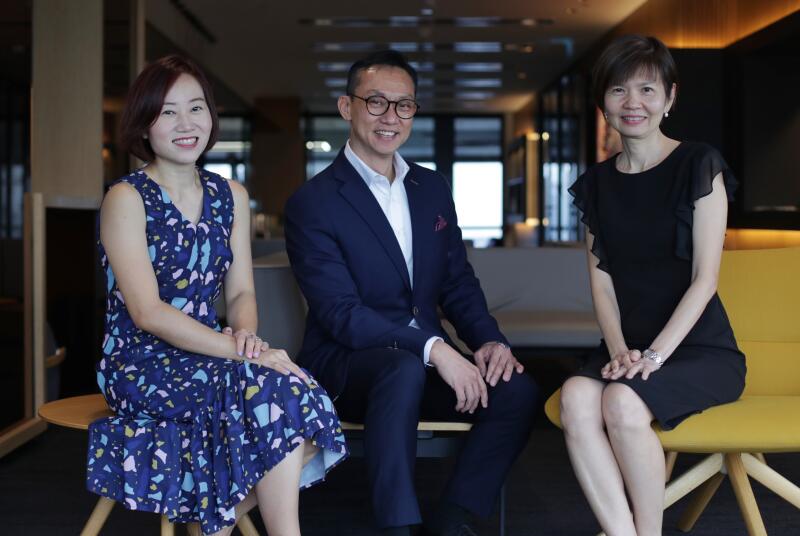BRANDED CONTENT
PSLE leave, parenting courses and lactation rooms: How a local company is retaining talent through family-friendly policies
Listening to employees and meeting their needs through thoughtful measures can sometimes be more attractive than monetary compensation

Implementing family-friendly policies can create a positive image that helps with talent attraction and retention.
PHOTO: GETTY IMAGES
Implementing family-friendly policies isn’t meant to be a popularity contest or chasing after a high take-up rate. Instead, when planning such policies, it is all about designing them to meet the needs of specific groups and touching employees who need the support.
That is what OCBC Bank and its head of group human resources, Ms Lee Hwee Boon, believes. “It’s not one size fits all,” she said. “We do not view our people policies from a sacrifice or cost perspective. For us, it is always about doing what is best for our people.”
The local bank has enacted a host of family-friendly workplace policies over the years, striving to make them inclusive, flexible and future-proof.
That means embracing the different demographic profiles of employees, said Ms Lee, and creating policies that reflect the circumstances of employees who may be at different life stages, with slightly different requirements and in different locations.
“We don’t want our policies to be designed such that they just respond to a situation as it comes up, but we want to be able to anticipate and take a slightly longer term view of what our people or workforce needs, and be able to design policies that will carry us through to that time,” she added.
That philosophy was what led to the launch of MyWellness Fiesta in 2019, a series of workshops, talks and activities on wellness. This was coupled with a mental well-being programme, where employees and their family members received access to counselling sessions, among other services.
Leave accommodation
To pick up on areas of concern, Ms Lee noted that it’s important to keep an ear to the ground. Paying attention to employees’ needs, for example, led to the bank creating the PSLE Leave Accommodation policy, which was introduced in 2012.
This scheme gives employees with children preparing to take their first national examination – the Primary School Leaving Examination – the option to carry forward up to 15 days of leave from the preceding year, more than double the usual 7 days. This year, 52 employees requested for the PSLE leave.
Children at that age, 12 years old, may still turn to their parents first when it comes to preparing for the exam, Ms Lee explained. “I do feel that parents think that this is the time where family support is more important for the kid,” she added.
Before the policy came into force, parents either had to take unpaid leave, or perhaps take an entire year off to be with their child throughout their time in Primary 6. “We asked ourselves: ‘If we want to be true to how we think about supporting our employees, what could we do?’”
Ms Lee recalled using her PSLE leave to bring her own children out for ice cream, or to go to the playground. “I found it useful just to be there as a form of moral support and to give a sense of balance to a very trying period for them,” she said.
Parenting support
Mr Dennis Lee, senior vice-president of consumer financial services risk and prevention, found that the PSLE Leave Accommodation Policy has been highly utilised among his team.
However, with 3 teenage children, the bank’s Employee Resource Group initiative, which is currently running a course on parenting with teens, is more relevant to him.
Introduced in 2014, the resource groups, centred on different themes, bring in external coaches who can teach, chair discussions and offer advice. These sessions are conducted once a month, with each theme lasting 6 to 10 sessions.
He decided to enrol in the programme after an eye-opening discussion with his children. “I remember my kids told me: ‘Dad, we know that we are growing up. We don’t have to spend a lot of time with you, but quality time is important.’”
Through the session on parenting with teens, he recognised his shortcomings in his relationships with his children, and is now working harder to improve on the level of communication, to understand them better, and learn to guide them.
He recalled an instance when his daughter said he was sarcastic to her in a conversation before he left for work. He reflected on that and sent her a text to apologise, which she accepted. Clearing the air took the niggling worry off his mind and allowed him to focus on his work that day, he said.
“We need to bring ourselves down to communicate with them, (not just talk down to them) like an authority figure,” he said, admitting that habits are hard to change, but he is learning to be more mindful of his mannerisms.
Mr Dennis Lee is also now more conscious about what they do in the time they have together. Rather than staying home to watch television and have dinner, which he said is the “natural thing to do” for the family, he recently organised a trip to Gardens by the Bay over the weekend for some family-bonding time.
“All 3 children were pretty open to it, which was quite nice, to be frank,” he said, adding that he is now more motivated to plan more of such family activities.
“There’s a lot of expertise out there that you can reach out to (for parenting help), but sometimes, when there’s so many – who is the right party? So I was quite glad that OCBC helped us to narrow it down,” he said.
The sessions have also created a sense of camaraderie in the workplace. “These are topics that you don’t typically talk about in the office with colleagues,” he said. “But with like-minded individuals coming together… we are able to share some experiences and you start to fall in small communities.”
In-house facilities
Ms Donna Teo, the assistant vice-president of analytics at OCBC’s group data office, started her family when she was already at the bank, and this helped ease the challenges somewhat for the mother-of-two.
The lactation rooms available to nursing mothers had been a highlight for her. In Parliament in August, member of parliament Louis Ng cited a local survey of 970 respondents by the Breastfeeding Mothers’ Support Group Singapore this year, which found that 8 in 10 working mothers said that lactation rooms are one of the things they need most.
Mothers in other companies have shared stories with her about locking themselves away in meeting rooms, or sequestering themselves in toilets to pump breast milk, said Ms Teo.
“Some of them, if they have a female boss, might be (treated with) more empathy,” she said, adding that at OCBC, support for employees is instead written into policies.
Also helpful in the early years of working motherhood was The Little Skool-House childcare centre operating out of the OCBC Centre, said Ms Teo, where bank staff are offered priority places and subsidised rates.
With her husband also working at the organisation, the early mornings and the evenings after work were convenient when the entire family could travel to and from the same location.
The proximity is also convenient if anything crops up, she said, recalling incidents where her children had fallen ill and needed to be rushed home from school.
Now that her older child has just started primary school, while the younger remains in childcare, the husband and wife duo has a divide-and-conquer strategy.
Ms Teo usually goes in to the office once a week, while her remaining work days are spent working at home with her daughter, enabled by OCBC’s flexible remote working policies. Her department is allowed to work from home for up to 5 days each week.

Mutual benefit
With the organisation spearheading the push for a supportive work culture, in his managerial role, Mr Dennis Lee feels a responsibility to “similarly exhibit that kind of empathy” to staff. Ms Teo added: “There are a lot of colleagues who don’t have kids, and nobody will ever say: ‘Why can she do this?’ It’s more like a family culture.”
While family-friendly workplace policies are beneficial for employees, their impact on the company itself is also significant.
Companies with family-friendly policies create a positive image that can help talent attraction, said Mr Dennis Lee. They are also effective at talent retention – the policies create “stickiness” to the company, enabling a lifestyle change that becomes a very important consideration when considering other job opportunities.
“It’s not just about the dollars and cents of compensation,” he said.
Ms Lee Hwee Boon noted that OCBC’s internal employee referral program is “becoming a larger part” of where it finds staff, as employees become “ambassadors” of OCBC within their own circles of influence.
“That in itself is a very positive reflection that we’re doing things right for our own employees,” she said.
Ms Teo said that these policies are important to potential employees, adding that friends that she had successfully referred into the company had compared the benefits of companies that they were applying to.
Said Ms Lee Hwee Boon: “Right now, the war for talent is on. If we do not take a progressive view of our relationship with our employees – proactively addressing not just professional and work demands, but also well-being demands – we will then become a place where there is only work and transaction. I think that’s not the culture of OCBC.”
Beyond OCBC
Besides caring for employees, OCBC also recognises the importance of engaging and supporting underserved and vulnerable communities in creating a sustainable society.
In 2021, the banking group donated S$3.2 million to beneficiaries, 63.6 per cent of which went to families, including children and youths. It has also run various community development initiatives, including some that support low-income families with financial management and food security and fund preschool education for children from needy backgrounds.
Key corporate social responsibility programmes at OCBC include:
- Helping set up community shops with Food from the Heart
- Funding pre-school education through OCBC-NTUC First Campus Bridging Programme
- Skills-based volunteering with data analytics, financial literacy-based support
- Virtual activities with seniors during Covid
With OCBC, Ms Teo has previously made keychains with children with autism for a fundraiser, as well as planned a day of food and games for seniors in an elderly home.
Volunteering results in wins all around, she said. Beneficiaries receive help, it boosts the company’s reputation and employees can bond over the activities and feel satisfied that they are making an impact.
Similarly, Mr Dennis Lee recently helped to pack and distribute healthcare items, food and essential goods to seniors and has in the past been part of a bread distribution programme for the needy.
Pre-Covid, he and his children would spend weekends on social service agency Shan You’s food ration distribution services. While the recent OCBC activity was limited to team members, he looks forward to involving his family in workplace volunteering in the future.
“This is something I am cultivating in my kids as well – to have empathy and care for others, to never take things for granted, to be appreciative and be grateful.”
This article is part of a series on family-friendly workplaces, supported by the Ministry of Social and Family Development.
Show your support for the Year of Celebrating SG Families. Learn more at go.gov.sg/CelebratingSGFamilies
This story was first published in The Business Times.

This is brought to you by Families for Life and the Ministry of Social and Family Development, in support of the Year of Celebrating SG Families.


